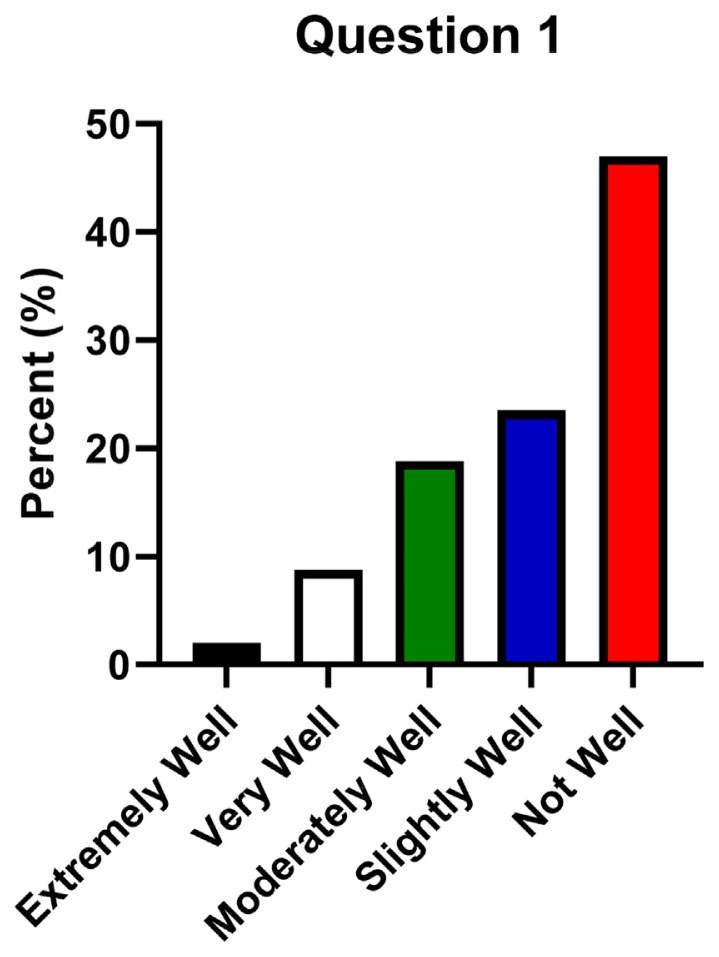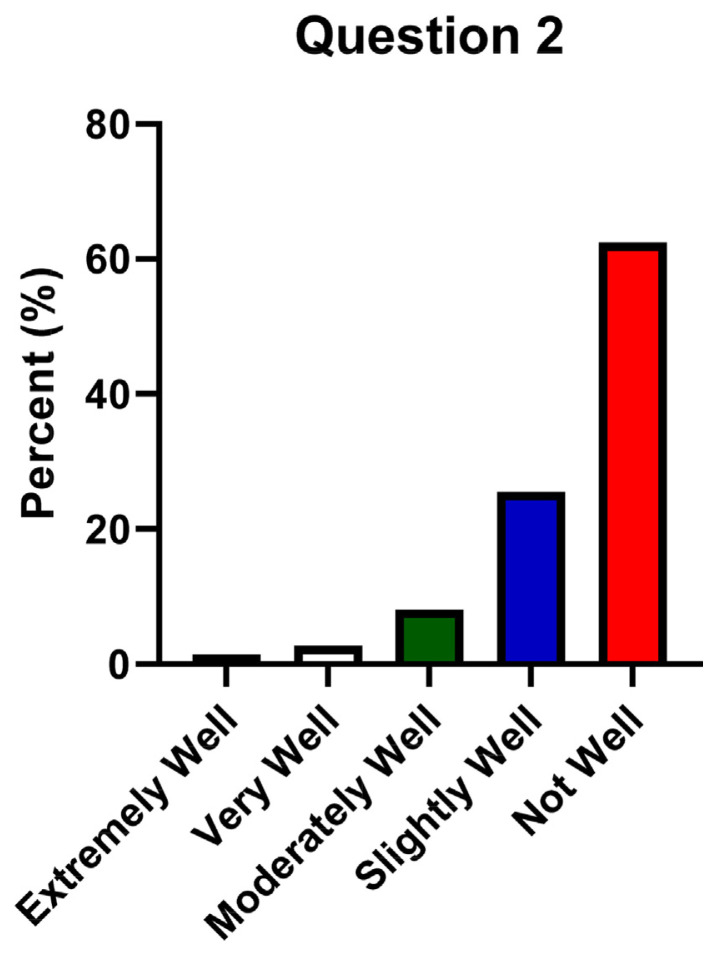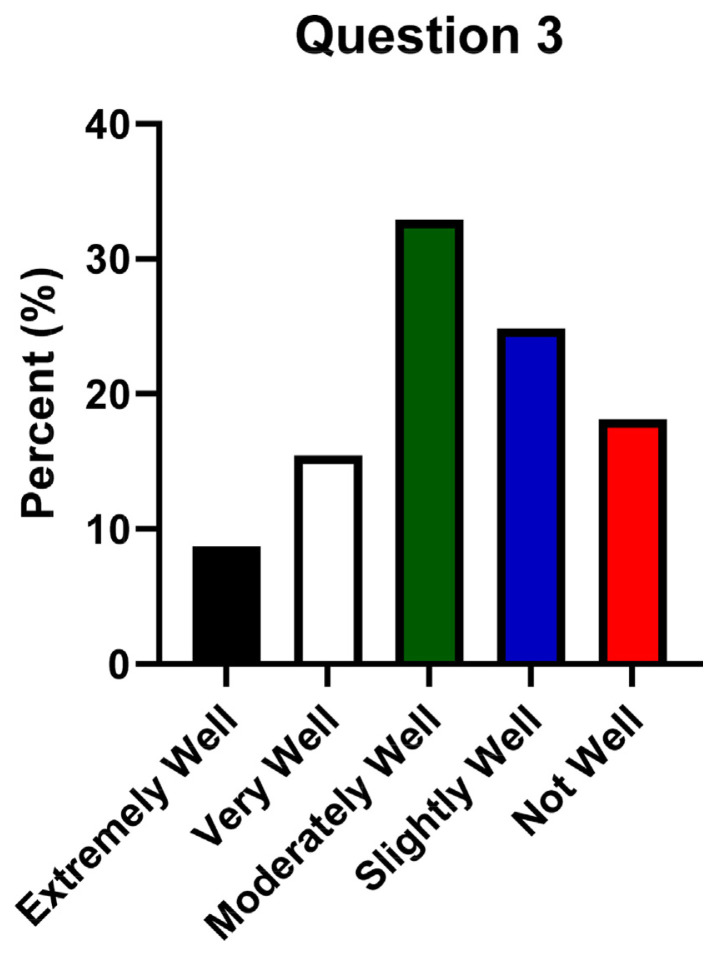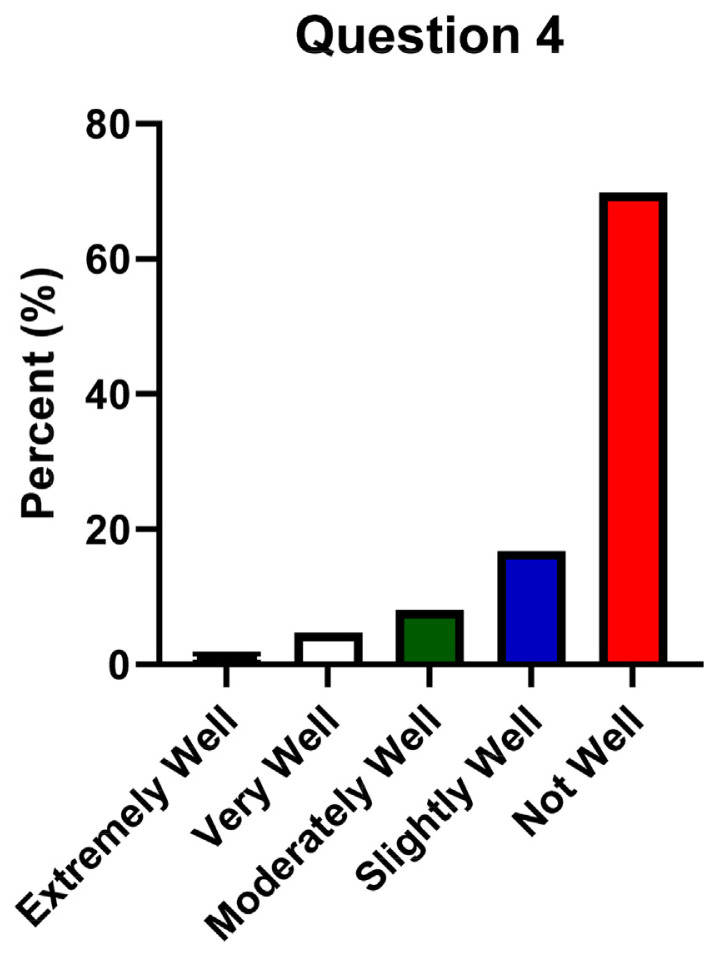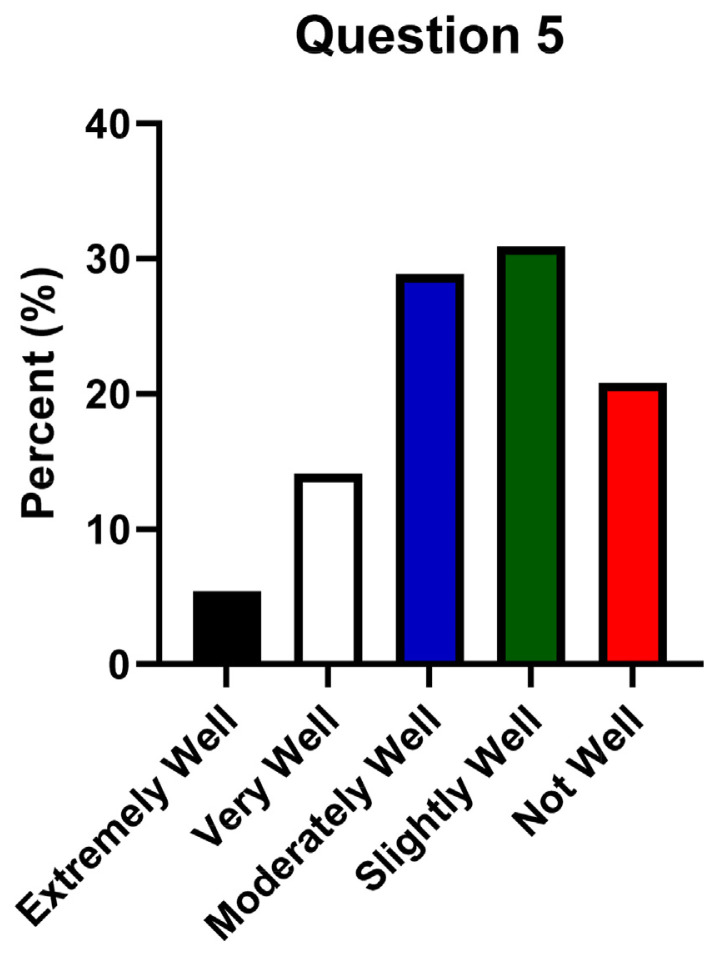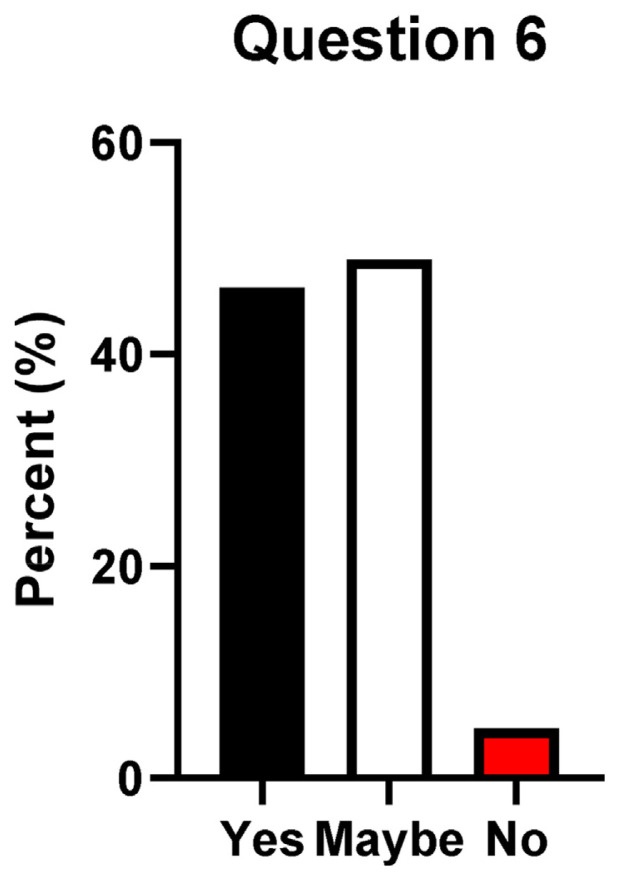Abstract
There is a popular trend for genetic test companies to market genetic screenings to identify detrimental mutations directly to consumers. As a result, there has been an increase in the number of patients wanting to discuss the results of their personal genetic tests with their physician. In turn, the medical education community has recognized a need to provide medical staff and patients with resources to interpret and act on personal genetic data. Most medical students and residents lack the requisite knowledge to interpret and manage patient-provided individualized genetic testing. This has prompted a growing interest among medical students in learning more about genetic testing and how to counsel their patients on this information. Consequently, early educational exposure to clinical genetic testing and counseling would benefit medical education training programs. In this study, we examine the perceptions of medical students in West Texas with regard to clinical genetic testing.
Keywords: Medical education, Clinical genetic testing, Attitudes
1. Introduction
The increasing availability of consumer genetic tests have provided a growing opportunity for patients to purchase a personalized genomic analysis screening for detrimental mutations without a referral to a clinical geneticist.1 The most common consumer genetics tests, such as 23 and Me and Ancestry.com, offer over-the-counter genetic services ranging from selected genetic mutation screenings to ancestry analysis.2,3 Greater access to genetic information from these over-the-counter tests has increased the number of patients who want to discuss their results with their primary care physician.4,5 However, a huge knowledge gap exists among medical students and residents in their ability to interpret and counsel patients on the results of personal genetic testing.6 This has prompted a growing interest among medical students in learning to handle clinical genetic testing for their patients.7 In this study, we examined the familiarity of medical students at our institution with the application of genetic testing in clinical settings.
2. Methods
The total number of participants in the study was 149 MS1–MS4 medical students at Texas Tech University Health Sciences Center (TTUHSC). Table 1 shows the distribution of students who participated in this survey, and the survey questions are presented in Table 2. The survey was available to students through TTUHSC’s Omnibus survey program for a period of two weeks. The identities of the participants were kept confidential. The data was then analyzed using GraphPad Prism Software (Figs. 1–6).
Table 1.
Distribution of MS1–MS4 students participating in study.
| Medical School Year | Count | Percent |
|---|---|---|
| MS1 | 43 | 29% |
| MS2 | 30 | 20% |
| MS3 | 42 | 28% |
| MS4 | 34 | 23% |
Table 2.
Questions used in Survey.
| Questions in Survey | |
|---|---|
| Question #1 | How well do you understand the guidelines for screening using clinical genetic testing? |
| Question #2 | How well do you understand the referral process to the clinical genetics department? |
| Question #3 | How well do you understand the benefits and risks of clinical genetic testing? |
| Question #4 | How well aware are you of the available genetic tests offered at your institution? |
| Question #5 | How well do you understand the results from clinical genetic tests? |
| Question #6 | Would you want clinical genetics to be a part of medical training during medical school and residency? |
Fig. 1.
How well do you understand the guidelines for screening using clinical genetic testing?
Fig. 2.
How well do you understand the referral process to the clinical genetics department?
Fig. 3.
How well do you understand the benefits and risks of clinical genetic testing?
Fig. 4.
How well aware are you of the available genetic tests offered at your institution?
Fig. 5.
How well do you understand the results from clinical genetic tests?
Fig. 6.
Would you want clinical genetics to be a part of medical training during medical school and residency?
3. Results
As shown in Table 1, the study included 149 medical students from all four years of medical school training (MS1 – 43 students, MS2 – 30 students, MS3 – 42 students, MS4 – 34 students), with an overall response rate of 30%. The students were asked basic background information before answering a series of 6 questions (Table 2) characterizing students’ familiarity/understanding regarding various aspects of clinical genetic testing. The questions assessed the student’s confidence about clinical genetic testing with regards to screening guidelines, the referral process, risks/benefits, specific genetic tests offered, interpretation of genetic testing, and whether clinical genetic testing education should be required for medical school and residency training. The responses to the questions are presented in Table 3A, 3B and Figs. 1–6.
Table 3A.
Percent of respondents for each response category for questions 1–5.
| Response | Q1 | Q2 | Q3 | Q4 | Q5 |
|---|---|---|---|---|---|
| Extremely Well | 2% | 1% | 9% | 1% | 5% |
| Very Well | 9% | 3% | 16% | 5% | 14% |
| Moderately Well | 19% | 8% | 33% | 8% | 29% |
| Slightly Well | 24% | 26% | 25% | 17% | 31% |
| Not Well | 47% | 63% | 18% | 70% | 21% |
Table 3B.
Percent of respondents for each response category for question 6.
| Response | Q6 |
|---|---|
| Yes | 46% |
| Maybe | 49% |
| No | 5% |
With regard to guidelines for genetic screening tests and the process for referring patients for clinical genetic testing, the majority of students (47% and 63% of all medical students, respectively) did not feel confident in their understanding of either topic. In contrast, when asked about the risks and benefits of genetic testing, only 18% of students felt that they did not understand the risks and benefits of clinical genetic testing. However, the vast majority of students (70%) could not identify the specific genetic tests that were routinely performed at their institution of training. Despite this limited knowledge of available genetic testing, only 21% of students indicated having issues with understanding and interpreting the results from clinical genetic tests. Apparently recognizing gaps in their knowledge, most students (95%) agreed to some extent that clinical genetic testing education should be incorporated into their medical training during medical school and residency.
4. Discussion
The lack of awareness on questions related to guidelines and referral of patients for genetic screening tests is indicative of the lack of exposure most medical students have to clinical genetic testing departments during their clerkship rotations. Exposure to guidelines and referrals is most likely to come about through isolated clinical cases where rare genetic disorders rely on genetic screening of newborns to guide treatment. Moreover, most students did not know the specifics with regard to genetic testing offered at their institution or where the samples were sent for analysis. However, this lack of awareness among undergraduate medical students is to be expected, given the wide variety of genetic analyses available for identifying and analyzing the genetic mutations specific to a particular patient. Interestingly, most students felt they had at least a somewhat reasonable understanding of genetic data interpretation, despite not knowing the specific genetic tests available. Students may expect genetic tests to be binary response of whether a patient has a particular genetic mutation or not. However, in reality many genetic screening reports provide limited information on the site, mutation type, method of analysis, and any corresponding literature providing information on the phenotypes or diseases associated with the mutation of interest. Subsequent interpretation of the clinical implications, such as prognosis and treatment, can be complex and is the responsibility of the physician.8
Given the increasing accessibility of consumer genetic tests, it is important that medical students be exposed to lessons in the curriculum designed to improve students’ understanding of both the use and limitations of consumer genetic tests. A study by Metcalf et al.9 reported the benefits of an online course developed in collaboration with the National Human Genome Research Institute and the National Coalition for Health Professional Education in Genetics for physicians and medical students to discuss the ethical, legal and social implications with genetic testing and counseling. The course consists of five modules to assess the user’s knowledge, attitudes, self-efficacy, and behavior towards consumer genetic tests. These modules were constructed around relevant genetics information, clinical scenarios, and case studies to create learning experiences that reflect real-life circumstances and stress the impact that genetic findings have on families. One motivation stated for their course was research indicating that physicians do not refer patients to genetic counseling services as frequently as is appropriate, in part due to a lack of understanding of the role that genetic counselors play in the care of patients.
A similar study at Stanford also used clinical modules to improve students’ knowledge of consumer genetic tests.7,10 The Stanford study concluded that “Personal genotyping may improve students’ self-reported motivation and engagement with course material. However, consultative support that is different from traditional genetic counseling will be necessary to support students. Before incorporating personal genotyping into coursework, institutions should lead multi-disciplinary discussion to anticipate issues and incorporate teaching mechanisms that engage the ethical, legal, and social implications of personal genotyping, including addressing those found in this study, to go beyond what is offered by commercial providers”.7 Consistent with the need to correctly interpret and convey the results of genetic testing is the push by medical schools in Japan, which have argued for the use of “genetic consultants” to provide both patients and physicians with accurate information on chromosomal and genetic testing.11
5. Conclusion
Given the increased frequency with which patients are approaching their doctor for interpretation of consumer oriented genetic tests and the dearth of formally trained genetic counselors, there is ample justification for including more emphasis on genetic tests and counseling skills in medical school curriculums and GME training. Most medical students and residents lack the requisite knowledge to interpret and manage patient-provided individualized genetic testing.6 Perhaps recognizing this deficiency, medical students have expressed an interest in learning more about genetic testing and how to counsel their patients on this information.12 Preliminary assessments of such curriculums indicate improvements in physician knowledge of genetic data were linked to increased patient–physician communication and interaction in several trials.13,14 Thus, early educational exposure to clinical genetic testing and counseling would benefit medical education training programs.
Footnotes
Financial disclosure
None.
Author contributions
Jonathan Kopel, Ph.D. and Gregory Brower, D.V.M., Ph.D. participated in the critical review, drafting, and submission of the final manuscript. All authors have given final approval to the manuscript.
Funding
None.
Conflict of interest
The authors whose names are listed immediately below report the following details of affiliation or involvement in an organization or entity with a financial or non-financial interest in the subject matter or materials discussed in this manuscript.
References
- 1. Roberts JS, Ostergren J. Direct-to-consumer genetic testing and personal genomics services: a review of recent empirical studies. Curr Genet Med Rep. 2013;1(3):182–200. doi: 10.1007/s40142-013-0018-2. [DOI] [PMC free article] [PubMed] [Google Scholar]
- 2. Wessel J, Gupta J, de Groot M. Factors motivating individuals to consider genetic testing for type 2 diabetes risk prediction. PLoS One. 2016;11(1):e0147071. doi: 10.1371/journal.pone.0147071. [DOI] [PMC free article] [PubMed] [Google Scholar]
- 3. Meisel SF, Rahman B, Side L, et al. Genetic testing and personalized ovarian cancer screening: a survey of public attitudes. BMC Wom Health. 2016;16:46. doi: 10.1186/s12905-016-0325-3. [DOI] [PMC free article] [PubMed] [Google Scholar]
- 4. Harris A, Kelly SE, Wyatt S. Counseling customers: emerging roles for genetic counselors in the direct-to-consumer genetic testing market. J Genet Counsel. 2013;22(2):277–288. doi: 10.1007/s10897-012-9548-0. [DOI] [PMC free article] [PubMed] [Google Scholar]
- 5. van der Wouden CH, Carere DA, Maitland-van der Zee AH, et al. Consumer perceptions of interactions with primary care providers after direct-to-consumer personal genomic testing. Ann Intern Med. 2016;164(8):513. doi: 10.7326/M15-0995. [DOI] [PubMed] [Google Scholar]
- 6. Salari K. The dawning era of personalized medicine exposes a gap in medical education. PLoS Med. 2009;6(8):e1000138. doi: 10.1371/journal.pmed.1000138. [DOI] [PMC free article] [PubMed] [Google Scholar]
- 7. Vernez SL, Salari K, Ormond KE, et al. Personal genome testing in medical education: student experiences with genotyping in the classroom. Genome Med. 2013;5(3):24. doi: 10.1186/gm428. [DOI] [PMC free article] [PubMed] [Google Scholar]
- 8. McPherson E. Genetic diagnosis and testing in clinical practice. Clin Med Res. 2006;4(2):123–129. doi: 10.3121/cmr.4.2.123. [DOI] [PMC free article] [PubMed] [Google Scholar]
- 9.Metcalf MP, Tanner TB, Buchanan A.Effectiveness of an online curriculum for medical students on genetics, genetic testing and counseling Med Educ Online 201015 10.3402/meo.v3415i3400.4856. [DOI] [PMC free article] [PubMed] [Google Scholar]
- 10. Ormond KE, Hudgins L, Ladd JM, et al. Medical and graduate students’ attitudes toward personal genomics. Genet Med. 2011;13(5):400–408. doi: 10.1097/GIM.0b013e31820562f6. [DOI] [PubMed] [Google Scholar]
- 11. Kohzaki H. A proposal for clinical genetics (genetics in medicine) education for medical technologists and other health professionals in Japan. Front Public Health. 2014;2:128. doi: 10.3389/fpubh.2014.00128. [DOI] [PMC free article] [PubMed] [Google Scholar]
- 12. Vernez S, Salari K, Ormond KE, et al. Personal genome testing in medical education: student experiences with genotyping in the classroom. Genome Med. 2013;5(3):24. doi: 10.1186/gm428. [DOI] [PMC free article] [PubMed] [Google Scholar]
- 13. Scheuner MT, Edelen MO, Hilborne LH, et al. Effective communication of molecular genetic test results to primary care providers. Genet Med. 2013;15(6):444–449. doi: 10.1038/gim.2012.151. [DOI] [PubMed] [Google Scholar]
- 14. Légaré F, Robitaille H, Gane C, et al. Improving decision making about genetic testing in the clinic: an overview of effective knowledge translation interventions. PLoS One. 2016;11(3):e0150123. doi: 10.1371/journal.pone.0150123. [DOI] [PMC free article] [PubMed] [Google Scholar]



